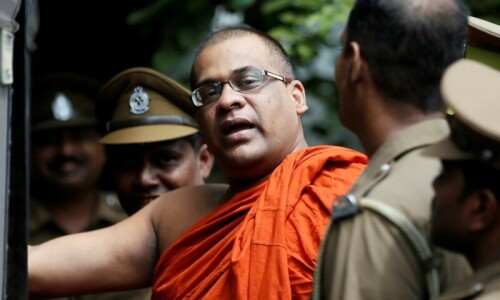History invariably gets distorted; sometime due to a specific perspective and at times by deliberate intent in order to project and promote certain agendas.
A specific perspective imperceptibly inclines an author to pick and choose what supports his or her clearly laid-out thesis or some hidden supposition. Completely objective view of history seems to be almost impossible.
Human affairs are connected with opposing historical forces reflecting the fundamental conflicts and contradictions that underpin the evolved social structures. But in certain eras distorting facts or their meanings is considered a virtue that purportedly fulfills objectives which seem noble. Such a phenomenon is frequently found in the era of colonialism.
Colonial masters deliberately glorified their own history and twisted that of indigenous people to prove two things; one, they being occupiers armed with scientific knowledge, were superior to the colonised. Two, the colonised were inferior for the fact of being colonised as they were thought to have nothing in their past or present which could act as a countervailing force. What the masters offered had no insidious intent. Historical conditions had tasked them with a ‘civilising mission’. One such a glaring example was the periodisation of Indian history into Hindu and Muslim eras which emphasised the communal aspect of Indian society. It was a thinly concealed attempt to drive a wedge between Hindu and Muslim communities. The enslaved on their part distorted their own history by dusting off quasi-historical and mythical personages from their past and made them larger than life so that they could be juxtaposed against the real historical figures of the enemy who stood for reason, rational thinking and scientific knowledge.
Nevertheless it served the purpose; it created a sense of unity and pride among the masses and galvanised their spirit of resistance against the colonial stranglehold.
Tempering with historical facts continues as a tool of nation building in our post-colonial state. Independence in no way has helped the society and the state to develop independent mind. The flawed state narrative starts the country’s history with the Arab invasion of Sindh culminating into creation of a Muslim state in 1947. It conjoins faith with history deliberately obfuscating the fact that peoples of this land have long history predating Islam.
People in some way can change their present or future with the change of faith but not their past. State narrative doesn’t hesitate a bit to equate language with faith. Urdu has been declared the language of Muslims while historical fact is that it’s language spoken by multiple faith communities inhabiting a particular region.
The official histories also vehemently denies the diversity that defines the evolution of peoples of this ancient land. In their efforts to resist and reject the state narrative which has feet of clay, advocates of nationalities and activists of linguistic groups and sub-groups happily manufacture their own histories for their politically-driven agendas which in no way implies that the intent is nefarious.
The Sindhi nationalists, for example, who resist the dictates of our over-centralised state, would claim that world wouldn’t have been there if there was no Sindh or in pre-Islamic Sindh masses led an idyllic existence. They also deny the diversity in Sindh while advocating the acceptance of it in other regions of the country. Sariaki must have its rights in Punjab but not in Sindh. Sariaki linguistic group has to be Sindhi in Sindh but distinctly separate in Punjab, goes their logic of political expediency.
Pathans claim they are a martial race and has never been subjugated while the fact is that they have been subjugated most among all the nationalities of the country. Iranians, Greeks, Huns, Arabs, Turks, Mongols, Punjabis, British, Russians and Americans have overwhelmed them and ruled their land.
Punjabi culture activists, who are far and few, claim they are at the receiving end despite being a dominant part of oppressive set-up that rules the country. They like their Sindhi counterparts deny the phenomenon of diversity in their land. They assert that Sariaki is not separate from Punjabi. The evidence they offer in support of their argument is that classical literary Punjabi subsumes Multani which is now called Sariaki. They conveniently forget that in the course of social and cultural evolution a dialect may branch out and emerge as a separate language from its parent. Sariaki activists act no differently. They deny their literary and cultural past by refusing to acknowledge the organic links they had and still have with Punjab. It’s hilarious to find that with a view to establishing a separate and distinct entity of Sariaki, the‘Dictionary of the Jatki or Western Punjabi’ complied by Andrew Jukes has been printed as “Saraiki Urdu Lughat’. It’s amusing to note that in this movement the vanguard role is being played by activists from peripheral areas across the river Indus where people are bilingual i.e. they speak Sariaki and Balochi.
Punjabi activists in their new found zeal go overboard in their search for symbols of resistance and defiance in their history. They for instance demonise Emperor Akbar against whom Dullah Bhatti organised a resistance movement to get rid of heavy taxes imposed and extracted by Mughal apparatchik. Now the ritual of ‘Lohri’ which celebrates the beginning of end of winter has been falsely associated with Dullah Bhatti who purportedly rescued two Hindu girls who were being forced to convert their faith. Imagine happening this in the most secular era of Indian history when diversity and plurality was promoted and celebrated at official level. Doing this the activists forget that the ritual is much older.
The simple question is: are we still that naïve that we can’t afford to have our ideological, cultural and political conundrums solved without upending our past? Let’s remember that by distorting the past we would end up with distorted future regardless of noble intentions. Facts and fiction are two separate things and conflating them would be monstrous. — soofi01@hotmail.com
Published in Dawn, February 1st, 2021














































Dear visitor, the comments section is undergoing an overhaul and will return soon.